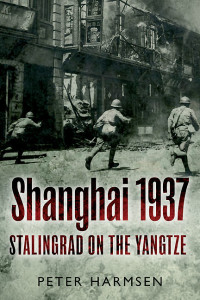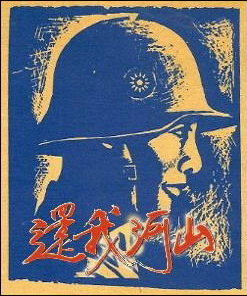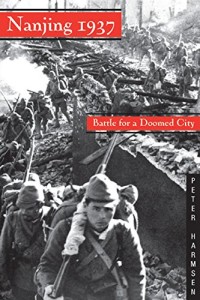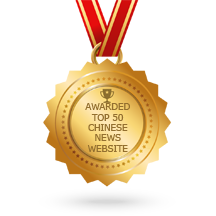Books
Nanjing 1937:
Battle for a Doomed City
320 pages
Over 50 rare photos,
many never published before
Twelve detailed maps
“Peter Harmsen has written a very important book about the Japanese defeat of Chinese Nationalist forces in defending their national capital, Nanjing… His final chapter on the Rape of Nanjing is one of the most powerful descriptions of those events as well as perhaps the very best analysis of why this most horrendous event occurred.” — J. Bruce Jacobs, Emeritus Professor of Asian Languages and Studies, Monash University, Melbourne, Australia
“This terrific piece of work fills a conspicuous void in English language… Harmsen achieves a remarkably even yet clear-eyed account that perhaps only a foreigner could achieve in approaching this searing collision of China and Japan.” –Richard B. Frank, author of Guadalcanal and Downfall
“Peter Harmsen has once again ingeniously woven a vast range of Chinese, Japanese and Western source materials into a vivid tapestry of intense personal experience and world-shaking international conflict.” — Robert A. Kapp, author and past president, The US-China Business Council.
Also by Peter Harmsen:

“Genuinely shines by interlacing the chronology with plenty of personal anecdotes and quotidian details… Exposes the banal cruelty of war, in the same vein as All Quiet on the Western Front.” –City Weekend Shanghai
“This book is meticulously researched, and vignettes are included from generals and privates alike… gives a sense of the battle’s breadth and horror.” –Military Heritage
“Takes the casual reader as well as the avid military history enthusiast on a horrific journey down the blood-soaked alleys and war-ravaged suburbs of one of China’s greatest cities… a must-read.” –Sampan
“Mr Harmsen is an excellent writer. The book rattles along like a modern techno-thriller.” –The Wargamer
“‘Shanghai 1937’ has all the elements of a fabulous historical novel… Comparisons by online reviewers to Antony Beevor, author of ‘Stalingrad’ and ‘Berlin,’ are justly deserved.” –Taiwan Today
“What’s special about this book is its comprehensiveness, shifting between Chinese, Japanese and foreign points of view…. Also uses the memoirs of numerous foreigners. In this respect it is richer than many works in the Chinese language.” –Shenzhen Special Zone Daily
“Engaging account of a little-known battle… practically nothing else in English tackles this topic at this level.” –Stone and Stone
“Dramatic documentary thriller… extremely high information and entertainment value.” –Jyllands-Posten
“I recommend it heartily. Even if you thought you knew all there was to know about the Second World War, if you haven’t read up on the Sino-Japanese conflict, you’ve missed one of its principal roots.” –PJ Media
“This is an unusual book way outside my comfort zone of western based history and is exactly as the author intended. He challenges the notion that the Second World War began in 1939 and he has a point. I am pleased to have read it… The photographs included are fantastic, other editors would do well to look at how the selection has been made here… If you are looking to expand your world knowledge to the Middle Kingdom, have a look at this book.” — War History Online
“An engrossing study that goes far to fill the gap in the historiography of a neglected theater of operations and the first large-scale urban battle of the war” — Michigan War Studies Review
“Fills a huge historiographical void. The story is told in a highly riveting manner… Almost impossible to put down once you have started, and even harder to put aside after you have finished the last page.” — Weekendavisen
“Harmsen, a two-decade veteran of east Asia, demonstrates a breathtaking command of the battle itself – from the 10,000 meter, panoramic view of the terrain and history, down to the platoon level.” — Asian Review of Books




 Copyright © 2024
Copyright © 2024
Hello, I just wanted to say that I had ordered the book and I finished reading it earlier this week. It is a compelling narrative of a battle that I know very little about.
Just started reading your book, excellent so far. So nice to finally have a well researched book about this battle in English.
Thank you very much. Delighted that you like it so far!
Another book I would recommend is The Generalissimo: Chiang Kai-shek and the Struggle for Modern China by Jay Taylor. It has a detailed account about the war from the Chinese perspective.
Peter, I just wanted to say what an achievement the Shanghai and Nanjing 1937 books are. I bought the both at the same time and got through them both in less than 4 days. They really added a lot of light to a massive conflict that rarely gets any coverage beyond China and Japan, and debunks the myth that the Chinese military was a useless outfit. As a Scottish, Chinese half-breed, I have to say it gave me great pride to read of the spirit and sacrifice of the Chinese defending armies.
More importantly, these two books have pushed to read deeper into the conflict and the various battles. I do hope you continue writing more books in this series, particularly the amazing victory of the Chinese at Taierzhuang, following the tragic scenes of Nanjing.
All the best, and much respect
Gordon Steel
Gordon, thank you very much for the kind words. I hope my books can serve as a tribute to the sacrifice brought by millions of Chinese during those fateful years. Their story has been downplayed for too long, but I believe we in the West are finally waking up to this important aspect of the global history of WW2.
Peter Harmsen
Your books are extremely well written and got me really interested in China’s World War 2. I hope that someday you might write a book describing the Chinese victory in Changsha. I think it deserves some attention and I really want to learn more about it. Thanks.
Peter, thank you very much for writing those books on Shanghai & Nanjing 1937. I finished Nanjing last weekend, having bought it after reading Shanghai.
Please consider writing another on the war in northern China. You may find some relevant information regarding the Japanese army air force involvement there, by author Dr. Y. Izawa: ‘Rikugun Jubakutai’ and ‘Rikko & Ginga’.
Regards,
Ken Glass
Ken,
Thank you very much for your suggestion. The war in Northern China is a hugely interesting subject, and I will definitely consider it as the topic of a future book.
Best regards,
Peter Harmsen
Peter,
Having read both your excellent books (and many others), I would agree with the Chinese perspective of 1931 as a starting date (actually I would go further and say WW1 never really ended – every year there was fighting somewhere among the same combatants, GB had troops in action every single year of the 20’s and 30’s for example). I don’t think the rest of the world would wish to agree with China, however.
Perhaps an area to cover would be the role of the German advisors of the Nationalists after 1939. Were they interned? Did they continue to advise and in some noted instances that happened in 1937, continue to fight for China?
Regards,
Mark.
Mark,
Thank you very much for your comment. The German advisors continued in their roles until 1938, when they were pulled out, due to Germany’s growing friendship with Japan. A few of them, most importantly the chief advisor Falkenhausen, remembered their Chinese friends and resumed their contact after 1945.
Best regards,
Peter